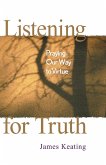A first approach to understanding humility is to see it as that total self-acceptance typical of untarnished humanity. Those who are humble experience no shame. They do not need lies and evasions to inflate their importance in the eyes of their associates or to buttress their self-esteem. They have overcome the tendency to regard others as competitors or rivals, and so they work with whatever they have, and waste no time envying those who possess different qualities. The humble are equally content with both the gifts and the limitations that come from their nature or their personal history. Humility brings with it a fundamental happiness that is able to cope with external difficulties and sorrows.








